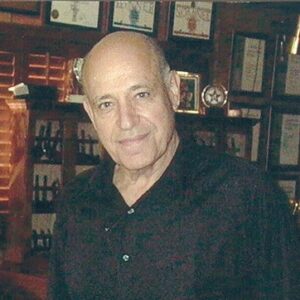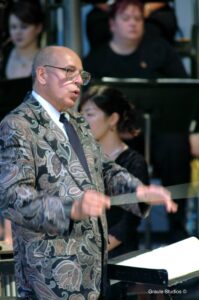
Robert Austin Boudreau, founder and music director of the American Wind Symphony Orchestra, died at the age of 97 on July 4, 2024.
On June 23, 1957, Robert Austin Boudreau conducted his first concert along the banks of the Allegheny River in Pittsburgh, PA. The stage for this performance was the Point Counterpoint I, a refashioned coal barge that had been resurrected from the mud, where it had been ditched near Neville Island. For the next 60 years the Point Counterpoint I, and then the more contemporary and self-propelled Point Counterpoint II, designed by Louis Kahn, would ply the rivers of the United States and the world, bringing communities together around music, art, and poetry, gathering neighbors and friends along America’s – and later the world’s – waterfronts to share an evening of unforgettable music and showmanship. During his long and illustrious career, Boudreau championed new music, commissioning over 400 works for a newly coined ensemble called a “Wind Symphony Orchestra” and, through a productive relationship with C.F. Peters publishing house, ensured these became standard repertoire. With the doubling of the woodwind, brass and percussion sections of a symphony orchestra, Robert created a new sound, and the American Wind Symphony Orchestra (AWSO) was born.
A 1971 Time Magazine article stated, “It may just be that there is no greater innovative force in American music than Robert Boudreau.” The King of Sweden honored Boudreau in 1979 as a “Knight of the North Star” for his accomplishments in focusing on the arts of the world. In the early 2000s Timothy Reynish, president of the World Association for Symphonic Bands and Ensembles wrote:
“I believe that when the history of patronage of music in the 20th and 21st centuries comes to be written, the name of Robert Boudreau will stand there amongst the greatest artistic patrons of all time…I cannot remember any patron of the arts who was involved not only in the raising and dispersal of funds, but also in the creation of art, let alone the organization of the medium itself, and the piloting of the ship on which the artists traveled and played.”
AWSO musicians were the cream of the crop, selected through competitive auditions from around the country (and world), these young (average age 22) performers would go on to populate major orchestras and professorships in colleges and conservatories throughout the world. An AWSO experience held a lifetime of memories. One such musician was Miles Hearn, a French Hornist who hailed from Canada and joined the Wind Symphony for the 1968 tour. His reflection on that year paints a perfect portrait of the impact that a Wind Symphony summer could have on a young impressionable musician. “1968 was a superb experience and I loved [Robert]. We had Louis Armstrong among others as soloist. (I still have the programme). I saw my first colour TV and slept in a house which had air-conditioning for the 1st time. This was the summer that Robert Kennedy was killed so we played lots of memorials. We had a black trumpeter who had to sleep on the bus in certain towns, so I saw a big difference between the USA and my native Canada where a black kid was president of the student body at my high school. I went on to a 40-year orchestra career and owe a lot to [Robert].”
Boudreau studied trumpet early on with Georges Majer of the Boston Symphony. Then, as a student at Boston University, he was chosen to perform with the Boston Brass Quartet under the leadership of Robert King, later the editor of Music for Brass Editions, whose guidance and musicianship were seminal influences. From there he went to Juilliard, where his teacher was the legendary William Vacchiano. He was soon performing with the Edwin Franko Goldman Band and then the Metropolitan Opera and 1953-54 found him on a Fulbright Scholarship in Paris.
Teaching stints at Ithaca College and Lehigh University led finally to Duquesne University in Pittsburgh, where he was able, with the important mentorship of H.J. Heinz II, to begin realizing his dream of working with young aspiring musicians in developing the new sound of the wind symphony. With an innate gift for salesmanship, which began as a child selling eggs in Woonsocket, R.I. during the Great Depression, Boudreau approached foundations, businesses and government officials with energy and passion, building a funding base that continued to support the AWSO during its 60-plus years of existence.
Boudreau not only conducted the AWSO, but also set up the tours, traveling in the off-season to towns along the waterways of America with his projector and his charm. He always left the room richer in smiles and laughter and quite often with a small committee of dedicated folks already forming, determined to bring the AWSO to their town. The venues were small cities and towns along American riverbanks…places that normally would not have access to a concert hall or poetry and artist symposia. A quote from Business Week Magazine in 1964 described his achievements: “That the strains of symphonic music – and mostly contemporary music at that – flourish in such an unusual setting is largely due to Boudreau’s combination of talents as musician, innovator and practical entrepreneur.” Along with the music, Robert promoted riverfront development and improvements, joining forces with the likes of Pete Seeger and Pittsburgh Mayor, David Lawrence, to combat the rampant pollution encountered in his early days along the waterways where the boat traveled and at the waterfront areas where the Point Counterpoint moored.
In 1976, halfway through the maiden “Bicentennial” voyage of the Point Counterpoint II, he faced a decision that would shape the rest of his career and turn him from Conductor Boudreau to Captain Boudreau. When the latest in a long line of hired captains abandoned ship, Boudreau took over the helm, literally…piloting the 38-foot-wide Point Counterpoint II through a 42- foot-wide lock on the Erie Barge Canal after only 30 minutes of practice. He was a quick study. From then on, he and his family would guide the Floating Arts Center through thick and thin, trial and tribulation, stormy seas and blissful, beautiful sunsets blessing the evening waters.
In 1985, Boudreau was arrested by the US Coast guard for crossing Lake Michigan against their orders. Worn down by years of bureaucratic oversight and inconsistencies on just how to classify the unclassifiable Point Counterpoint II, he had had enough. Hauled off to jail in Charlevoix, MI, he was released for a few hours to conduct the concert that night, and during that memorable evening, he made an impassioned speech about the need to stand up for what you believe in, regardless of consequence. Alfred W. Wishart, who then headed the Pittsburgh Foundation and the Howard Heinz Endowment wrote at the same time period: “He’s amazing, a damn genius. He’s the original Music Man. Who could be against providing river towns with some good music? It’s a unique genre, on a floating barge. He’s a magnificent ambassador of Pittsburgh. He symbolizes a cultural idea born right out of our environment – people living along the rivers.”
Later years would bring Boudreau, his group of young musicians and the Point Counterpoint II across the globe to far-flung places, such as Leningrad (St. Petersburg) Russia; Paris, France; Montego Bay, Jamaica; Red Wing, Minnesota; and South Padre Island, Texas. Following Hurricane Katrina in 2005, Robert traveled to Louisiana, calling the tour “The Spirit of Louisiana”. Yo-Yo Ma, a friend of Boudreau’s, said about the boat: “it sails as a powerful, living testament to American creativity and to the elemental role that culture plays in human life.”
Born on April 25, 1927, and raised on a chicken farm in Bellingham, Massachusetts (something he never let an audience forget), he always retained his passion for the farming life. Raising goats and sheep on a farm in Mars, Pennsylvania, he could be seen in cut-off shorts and a white t-shirt, rototilling his garden and hauling manure up the hill to its designated plots well into his 90s. He leaves behind his beloved companion and soulmate of over 60 years, Kathleen. In later years a night wouldn’t go by without a game of Pinochle, Perquacky, or Quiddler – the three games religiously rotated on a nightly basis. Boudreau also leaves his 6 children, Wendy (Michael Morrissey), Robin (Thomas Palmer), Caryn, Jonathan, Josh (Gloria Caceres) and Tanya (Can Tutuncu) as well as 17 grandchildren. He would repeat so many times later in life just how lucky he had been, how good fortune had been so critical to his success and how the most important element in life is loving one another. He referred to every person he met as “My Friend”. He touched so many lives and left us with a lifetime of memories.